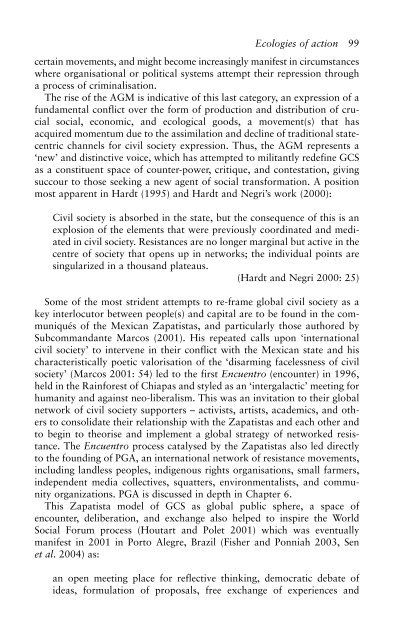Complexity and Social Movements: Multitudes at the Edge of Chaos ...
Complexity and Social Movements: Multitudes at the Edge of Chaos ...
Complexity and Social Movements: Multitudes at the Edge of Chaos ...
You also want an ePaper? Increase the reach of your titles
YUMPU automatically turns print PDFs into web optimized ePapers that Google loves.
Ecologies <strong>of</strong> action 99<br />
certain movements, <strong>and</strong> might become increasingly manifest in circumstances<br />
where organis<strong>at</strong>ional or political systems <strong>at</strong>tempt <strong>the</strong>ir repression through<br />
a process <strong>of</strong> criminalis<strong>at</strong>ion.<br />
The rise <strong>of</strong> <strong>the</strong> AGM is indic<strong>at</strong>ive <strong>of</strong> this last c<strong>at</strong>egory, an expression <strong>of</strong> a<br />
fundamental conflict over <strong>the</strong> form <strong>of</strong> production <strong>and</strong> distribution <strong>of</strong> crucial<br />
social, economic, <strong>and</strong> ecological goods, a movement(s) th<strong>at</strong> has<br />
acquired momentum due to <strong>the</strong> assimil<strong>at</strong>ion <strong>and</strong> decline <strong>of</strong> traditional st<strong>at</strong>ecentric<br />
channels for civil society expression. Thus, <strong>the</strong> AGM represents a<br />
‘new’ <strong>and</strong> distinctive voice, which has <strong>at</strong>tempted to militantly redefine GCS<br />
as a constituent space <strong>of</strong> counter-power, critique, <strong>and</strong> contest<strong>at</strong>ion, giving<br />
succour to those seeking a new agent <strong>of</strong> social transform<strong>at</strong>ion. A position<br />
most apparent in Hardt (1995) <strong>and</strong> Hardt <strong>and</strong> Negri’s work (2000):<br />
Civil society is absorbed in <strong>the</strong> st<strong>at</strong>e, but <strong>the</strong> consequence <strong>of</strong> this is an<br />
explosion <strong>of</strong> <strong>the</strong> elements th<strong>at</strong> were previously coordin<strong>at</strong>ed <strong>and</strong> medi<strong>at</strong>ed<br />
in civil society. Resistances are no longer marginal but active in <strong>the</strong><br />
centre <strong>of</strong> society th<strong>at</strong> opens up in networks; <strong>the</strong> individual points are<br />
singularized in a thous<strong>and</strong> pl<strong>at</strong>eaus.<br />
(Hardt <strong>and</strong> Negri 2000: 25)<br />
Some <strong>of</strong> <strong>the</strong> most strident <strong>at</strong>tempts to re-frame global civil society as a<br />
key interlocutor between people(s) <strong>and</strong> capital are to be found in <strong>the</strong> communiqués<br />
<strong>of</strong> <strong>the</strong> Mexican Zap<strong>at</strong>istas, <strong>and</strong> particularly those authored by<br />
Subcomm<strong>and</strong>ante Marcos (2001). His repe<strong>at</strong>ed calls upon ‘intern<strong>at</strong>ional<br />
civil society’ to intervene in <strong>the</strong>ir conflict with <strong>the</strong> Mexican st<strong>at</strong>e <strong>and</strong> his<br />
characteristically poetic valoris<strong>at</strong>ion <strong>of</strong> <strong>the</strong> ‘disarming facelessness <strong>of</strong> civil<br />
society’ (Marcos 2001: 54) led to <strong>the</strong> first Encuentro (encounter) in 1996,<br />
held in <strong>the</strong> Rainforest <strong>of</strong> Chiapas <strong>and</strong> styled as an ‘intergalactic’ meeting for<br />
humanity <strong>and</strong> against neo-liberalism. This was an invit<strong>at</strong>ion to <strong>the</strong>ir global<br />
network <strong>of</strong> civil society supporters – activists, artists, academics, <strong>and</strong> o<strong>the</strong>rs<br />
to consolid<strong>at</strong>e <strong>the</strong>ir rel<strong>at</strong>ionship with <strong>the</strong> Zap<strong>at</strong>istas <strong>and</strong> each o<strong>the</strong>r <strong>and</strong><br />
to begin to <strong>the</strong>orise <strong>and</strong> implement a global str<strong>at</strong>egy <strong>of</strong> networked resistance.<br />
The Encuentro process c<strong>at</strong>alysed by <strong>the</strong> Zap<strong>at</strong>istas also led directly<br />
to <strong>the</strong> founding <strong>of</strong> PGA, an intern<strong>at</strong>ional network <strong>of</strong> resistance movements,<br />
including l<strong>and</strong>less peoples, indigenous rights organis<strong>at</strong>ions, small farmers,<br />
independent media collectives, squ<strong>at</strong>ters, environmentalists, <strong>and</strong> community<br />
organiz<strong>at</strong>ions. PGA is discussed in depth in Chapter 6.<br />
This Zap<strong>at</strong>ista model <strong>of</strong> GCS as global public sphere, a space <strong>of</strong><br />
encounter, deliber<strong>at</strong>ion, <strong>and</strong> exchange also helped to inspire <strong>the</strong> World<br />
<strong>Social</strong> Forum process (Houtart <strong>and</strong> Polet 2001) which was eventually<br />
manifest in 2001 in Porto Alegre, Brazil (Fisher <strong>and</strong> Ponniah 2003, Sen<br />
et al. 2004) as:<br />
an open meeting place for reflective thinking, democr<strong>at</strong>ic deb<strong>at</strong>e <strong>of</strong><br />
ideas, formul<strong>at</strong>ion <strong>of</strong> proposals, free exchange <strong>of</strong> experiences <strong>and</strong>




